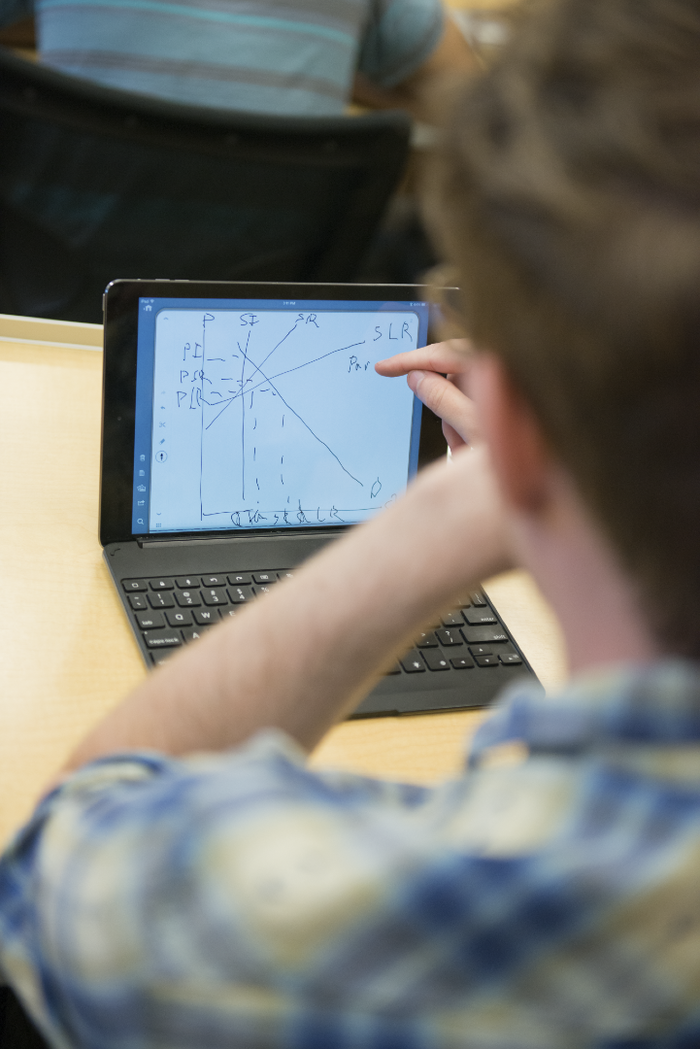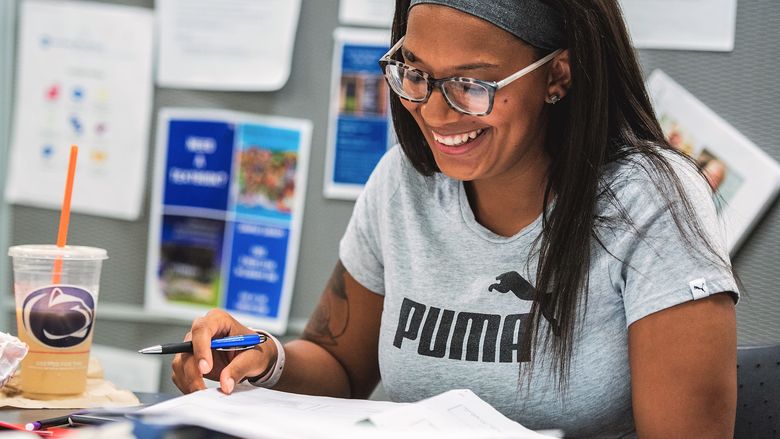DUNMORE, Pa. — The Spring 2020 semester is close to ending and that means finals week is right around the corner. However, this semester, due to the continuing COVID-19 pandemic, students will be doing their finals at home on their computers.
This creates a few challenges, such as inability to access physical library resources, faulty internet connections, and lingering stress from upcoming final exams. Fortunately, faculty and staff are doing their best to accommodate their students’ needs in these trying times — through virtual means.
Jennie Ann Levine Knies, Penn State Scranton’s head librarian, is helping students who previously often used the library as a quiet and relaxing place to study during finals. However, even she acknowledges that it may be difficult to find the right answer for creating a quiet work environment, as everyone may have too many people in their house doing too many things at once, creating a disruptive or chaotic environment.
Knies advises students looking for quiet places to study or minimize disruptions: “One trick that I use is to try to wake up earlier than everyone else in the house, or stay up later,” she suggested.
“I can do a lot while everyone else is asleep! If you have noise-cancelling headphones, those can block out noise; or discover quiet places in your home. I know one person who cleaned out a closet in order to use it as a study space. Another routinely goes and studies in her car because it is like a private study carrel," said Knies.
For students who would typically use the library to do research for final projects, Knies reminds everyone that even though the physical libraries are currently closed, University’s Libraries “Ask a Librarian” online chat services are available every day from 8 a.m. to 10 p.m. She also reminds students that they have access to the non-academic resources database.
“We extended our staffing of this service during the COVID-19 pandemic and it is very easy to use. If a student is struggling to find a source, finish a research project, correctly cite an item, etc., I hope that they will remember and log on to chat,” Knies said. “And of course, they can always contact their local librarians (me and Cameron Nielson at Scranton) to schedule a more in-depth meeting.”
There are also the library guides by subject at https://libraries.psu.edu/guides/subject, which can provide students with links and tips to commonly used databases for their major.
Associate Director of Learning and Disability Services Eileen Giovagnoli said students have been taking advantage of the availability of tutors by scheduling appointments in the WCONLINE to make sure they understand course concepts and engage in activities that will help prepare them for finals.
“Top students know not to wait until the last minute to make sure they know how the material and work with tutors on practice and review for exams,” Giovagnoli explained.
“Finals include at least several weeks' worth of material and some may even be cumulative covering material for the entire semester. Tutors can help students prepare study guides and review before exams. Also, the writing tutors are busy with students who have final papers and projects," added Giovagnoli.
The Learning Center has expanded its schedule by adding evening and weekend meeting times. Students with quick questions can also drop in on the Virtual Lunch with the Learning Center, Monday through Friday from noon to 1 p.m. through ZOOM (password: 816066.)
Additional drop-in tutoring also is available with Majid Chatsaz, assistant professor of engineering, for any student who needs help with Math 21, 22, 26, 110, EMch 212 and 213. His virtual office is available through https://psu.zoom.us/j/476296174 on weekdays from noon to 1 p.m. Students can also email him at [email protected].
A few tips to help students stay on track and improve their grades during finals include:
- Check the exam schedule on LionPATH
- Develop a study plan
- Space out study sessions to improve memory
- Focus on mastery of the materials
- Make a study guide
- Study with others virtually, and self-test
- Manage anxiety and get enough sleep
- Make appointments with tutors early
Dr. Katherine Stefanelli, campus counselor, also provided some tips for students who are struggling with the stress of finals week. She said that students can help cope with finals stress by feeling both prepared and taking time for self-care.
Planning study time and review is essential for a positive outcome, but stressing too much is counterproductive, she explained. Students can find ways to break up study time by taking a walk, exercising or enjoying a favorite movie.
“In a typical semester, I would be hosting Stress Busters week events such as Rock Painting, Pet Therapy and Mindful Meditations. Since we are doing things differently this semester, students can still get some stress relief with a wellness yoga class, meditation on my Youtube channel, or dropping into a Life Hacks session offered via Zoom by the University Park CAPS (Counseling and Psychological Services) staff,” said Stefanelli.
She also said preparing for finals week is key to not over-stressing. Students can organize their time to study sufficiently while taking breaks when needed, getting plenty of sleep and eating healthfully during finals week.
“Let your body do what it does best by giving yourself rest and good nutrition. Focus on your breathing when starting an exam to keep the oxygen flowing and anxiety at bay, and try some positive self-talk, reassuring yourself that you’re very prepared," said Stefanelli. "Then when the final is over, let it go."
English major Gabrielle McFey provided her own insight and experience on handling finals anxiety.
“I’m trying to take these upcoming weeks one day at a time, so I don’t stress myself out too much,” she said. “I feel relatively confident in my ability to pass my final. My science professor made a deal with us that if we did well on all the tests and we didn’t fail a test or miss a test, we didn’t have to take the last test. She emailed us individually and told us our grades. I received an A for the class! Not having to take the last test for that class has relieved some stress,” McFey said.
“The other finals are all papers except for my Asian Literature final, but it’s more of an open-ended/short answer test, asking general questions about the literature we read. We’re in the home stretch to the end of the semester and I’m just taking my assignments step-by-step while making sure I stay on top of the due dates.”
She also explained how the transition from in-person classes to online classes has been stressful to her as well as for other students.
“When you’re on campus going to classes, you don’t how fast everything goes by and how much work you get done. In online classes, it’s a little less structured and more self-paced, therefore, professors appear to assign more work,” she explained.
“I don’t think I’ve ever realized how much schoolwork I actually do when I’m in class on campus and when I go home. This quarantine has been making me reflect on life and school a lot!” McFey said.
“With online classes, it seems like I have more free time now that I’m at home," she added. "I can enjoy my coffee in the morning while in class, instead of rushing to get ready so I can make it to class on time. I can also multitask and maybe organize my bookshelf while I’m in class. One of the things keeping me sane is the ability to spend time with my cats and dogs while I’m at home.”
Mcfey would also like to remind everyone to take care of their mental health as well as their physical health during finals week.
“Everyone needs to eat and stay hydrated. Pet some animals and take a nap, too! Remember to take a break every now and again from homework so you don’t overwork yourself. And most importantly, do the things that make you happy! I personally have been writing creatively and reading,” Mcfey said.

